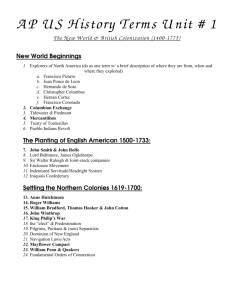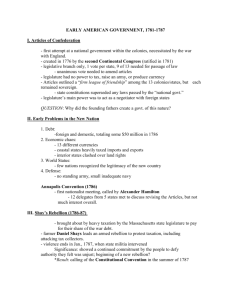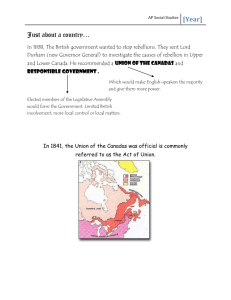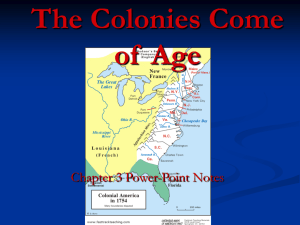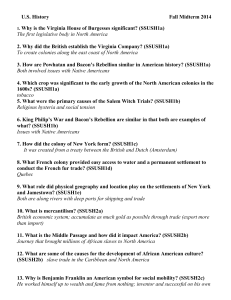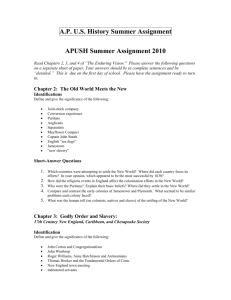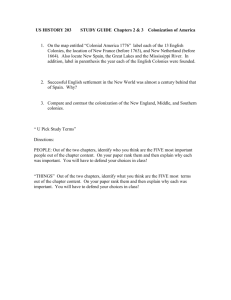US_History_I_files/HIST 2010 EXAM 1 STUDY GUIDE 2013
advertisement
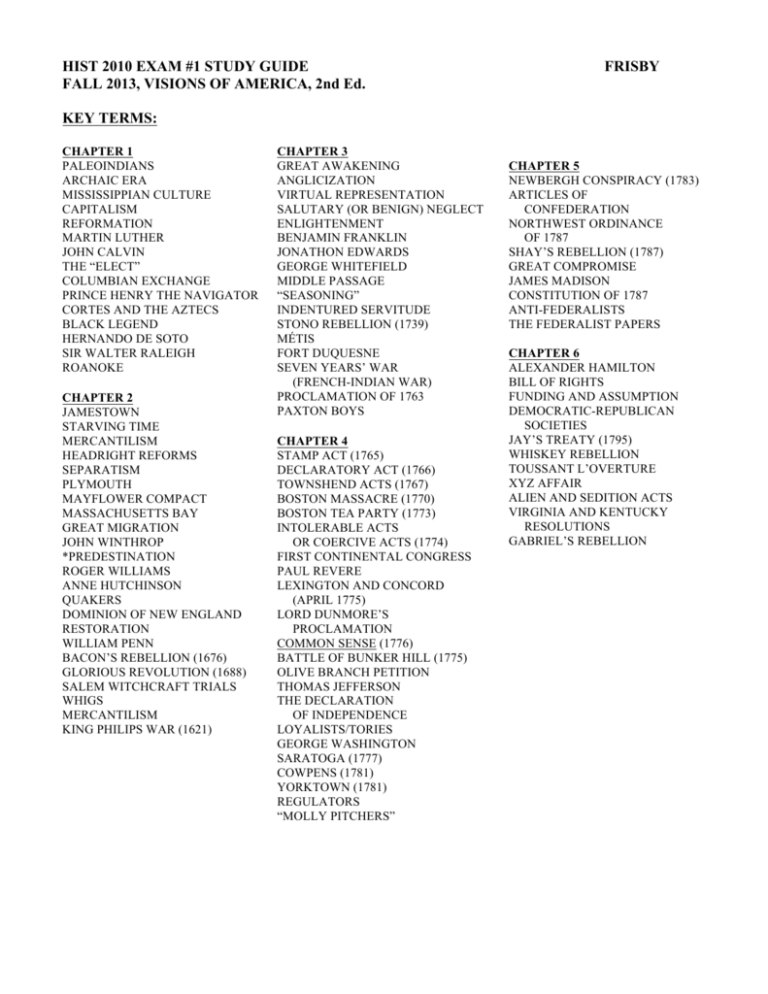
HIST 2010 EXAM #1 STUDY GUIDE FALL 2013, VISIONS OF AMERICA, 2nd Ed. FRISBY KEY TERMS: CHAPTER 1 PALEOINDIANS ARCHAIC ERA MISSISSIPPIAN CULTURE CAPITALISM REFORMATION MARTIN LUTHER JOHN CALVIN THE “ELECT” COLUMBIAN EXCHANGE PRINCE HENRY THE NAVIGATOR CORTES AND THE AZTECS BLACK LEGEND HERNANDO DE SOTO SIR WALTER RALEIGH ROANOKE CHAPTER 2 JAMESTOWN STARVING TIME MERCANTILISM HEADRIGHT REFORMS SEPARATISM PLYMOUTH MAYFLOWER COMPACT MASSACHUSETTS BAY GREAT MIGRATION JOHN WINTHROP *PREDESTINATION ROGER WILLIAMS ANNE HUTCHINSON QUAKERS DOMINION OF NEW ENGLAND RESTORATION WILLIAM PENN BACON’S REBELLION (1676) GLORIOUS REVOLUTION (1688) SALEM WITCHCRAFT TRIALS WHIGS MERCANTILISM KING PHILIPS WAR (1621) CHAPTER 3 GREAT AWAKENING ANGLICIZATION VIRTUAL REPRESENTATION SALUTARY (OR BENIGN) NEGLECT ENLIGHTENMENT BENJAMIN FRANKLIN JONATHON EDWARDS GEORGE WHITEFIELD MIDDLE PASSAGE “SEASONING” INDENTURED SERVITUDE STONO REBELLION (1739) MÉTIS FORT DUQUESNE SEVEN YEARS’ WAR (FRENCH-INDIAN WAR) PROCLAMATION OF 1763 PAXTON BOYS CHAPTER 4 STAMP ACT (1765) DECLARATORY ACT (1766) TOWNSHEND ACTS (1767) BOSTON MASSACRE (1770) BOSTON TEA PARTY (1773) INTOLERABLE ACTS OR COERCIVE ACTS (1774) FIRST CONTINENTAL CONGRESS PAUL REVERE LEXINGTON AND CONCORD (APRIL 1775) LORD DUNMORE’S PROCLAMATION COMMON SENSE (1776) BATTLE OF BUNKER HILL (1775) OLIVE BRANCH PETITION THOMAS JEFFERSON THE DECLARATION OF INDEPENDENCE LOYALISTS/TORIES GEORGE WASHINGTON SARATOGA (1777) COWPENS (1781) YORKTOWN (1781) REGULATORS “MOLLY PITCHERS” CHAPTER 5 NEWBERGH CONSPIRACY (1783) ARTICLES OF CONFEDERATION NORTHWEST ORDINANCE OF 1787 SHAY’S REBELLION (1787) GREAT COMPROMISE JAMES MADISON CONSTITUTION OF 1787 ANTI-FEDERALISTS THE FEDERALIST PAPERS CHAPTER 6 ALEXANDER HAMILTON BILL OF RIGHTS FUNDING AND ASSUMPTION DEMOCRATIC-REPUBLICAN SOCIETIES JAY’S TREATY (1795) WHISKEY REBELLION TOUSSANT L’OVERTURE XYZ AFFAIR ALIEN AND SEDITION ACTS VIRGINIA AND KENTUCKY RESOLUTIONS GABRIEL’S REBELLION HIST 2010 EXAM #1 STUDY GUIDE SPRING 2010, VISIONS OF AMERICAN, 1st ED. FRISBY QUOTES: Be able to recognize and explain the context of passages/quotes/labels from the following: “City upon a Hill” by John Winthrop “Federalist Papers” by Publicus “Sinners in the hands of angry God” by Jonathan Edwards “American Cincinnatus” Washington’s Farewell Address “Common Sense” by Thomas Paine “Remember the ladies” by Abigail Adams MAP EXERCISE: Locate the following on a map. Virginia New Jersey Hudson River Maryland Connecticut Ohio River Massachusetts Vermont Mississippi River New York South Carolina New York City Pennsylvania North Carolina Philadelphia Rhode Island Georgia Charleston Delaware St. Lawrence River Boston HIST 2010 EXAM #1 STUDY GUIDE SPRING 2010, VISIONS OF AMERICAN, 1st ED. FRISBY POTENTIAL ESSAY QUESTIONS GROUP 1 1. "The British colonies in North America from the first settlements until 1763 were not a land of opportunity. Instead they were founded on rigid notions of hierarchy that severely limited political participation, economic opportunity, and social mobility. As a consequence, various rebellions in the seventeenth and eighteenth centuries challenged traditional hierarchies." Assess the accuracy of this statement. You may agree or disagree with all or parts of it. In any case, be sure to cite specific information from both the lectures and readings to support your generalizations. 2. "The word that best sums up the experience of British colonization in North America from the first settlements through 1763 is 'failure.' This is true in terms of both the original purposes for the founding of various colonies whether in New England, the Chesapeake or in the so-called "middle colonies," and in terms of efforts by the British to integrate these colonies into a well run empire. There were few successes and many disappointments." Assess the accuracy of this statement. You may agree or disagree with all or parts of it. In any case, be sure to cite specific information from both the lectures and readings to support your generalizations. GROUP 2 3. "Between 1763 and 1776, the British government adopted a deliberate plan to destroy the liberties of the colonists in North America. Through a series of events, some colonists came to believe that their most sacred rights were jeopardy. The result of these policies was the first American civil war." Assess the accuracy of this statement. You may agree or disagree with all or parts of it. In any case, be sure to cite specific information from both the lectures and readings to support your generalizations. 5. Had you been living in the United States between the early 1780s and 1800 and been eligible to vote, would you have supported 1) the Federalist or Anti-Federalists; and 2) the Federalists or Democratic-Republican parties, (factions) in politics? Why? In answering this question, you must assess specific leaders and issues and deal with both foreign and domestic policy.
